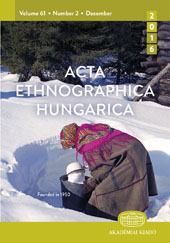ON PROXY CULTURAL MEMORY
ON PROXY CULTURAL MEMORY
Author(s): Vilmos VoigtSubject(s): Cultural Anthropology / Ethnology, Identity of Collectives
Published by: Akadémiai Kiadó
Keywords: Hungarians;cultural memory;mythical origin;invention of cultural identity;creative reference;(intermediate) forefathers;Scythia;Huns;Israel;peoples coming from the backside of European history;
Summary/Abstract: Intellectuals and (following them) also common people remember their distant origin. Cultural memory institutions maintain references to factual and historical past, and it looks back also to mythical origins, or connections with old (since then have often been extinguished) peoples. Virgil heroificated the Trojan origin of Rome. The identity of France embraces also the Celtic Gauls, the German Franks, and the local ancestors, speaking Romance languages. Moscow heralded herself as “third Rome” (Byzantium being the “second Rome”). There are many particular forms of the so called “cultural memory”: in pointing towards the glorious or unjustly lost ancestors. Hungary is another – not neglectful – clear case of constant searching for “intermediate” forefathers. Since the Middle Ages Hungarians have been connected (both from outside or inside of the country) with the Huns, and the country’s tragic history in 15th-17th centuries was compared with that of Israel, already depicted in the Old Testament. Historians of the 18th and 19th centuries, interested in Hungary, tried to prove the “oriental” (Persian, Aryan, Turanian, etc.) bases of Hungarian language and culture. My historical report ends by the end of the 19th century, but the same tendency is actual in our days too. I call that as “proxy cultural memory” – presenting one’s own culture through a “creative reference” to different and other (old) cultures. The “proxy identity” is not constructing one’s actual identity, but it aims to invent a constructed image about something else. It has two main characteristics: it covers the times from which we do not know proper historical facts – and it is a part of ideology. As such it serves the “nation’s characterology”, ethnic stereotypes and imagology as well.
Journal: Acta Ethnographica Hungarica
- Issue Year: 59/2014
- Issue No: 2
- Page Range: 389-395
- Page Count: 7
- Language: English
- Content File-PDF

